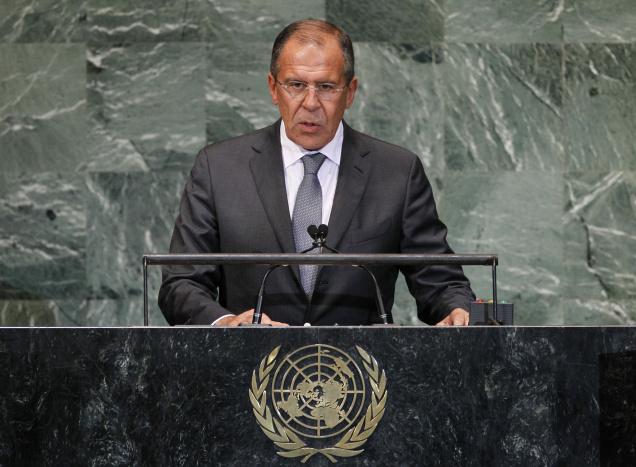
Dubai, September 30: With a little bit of help from Russia, the Americans and the Syrians have established contact with each other, sending shockwaves in Turkey, which has blamed Moscow and Beijing for the continuation of strife in Syria.
Addressing the American media on Thursday, Russian Foreign Minister, Sergei Lavrov dropped a bombshell. He said that Moscow had helped the American experts to establish contact with the Syrians on the subject of chemical weapons. “I hope I won't disclose any big secret, but we have helped American experts establish contact with the Syrians on this issue, and we have received explanations and assurances that the Syrian government is guarding these facilities in the best possible way,” said Mr. Lavrov, as reported by Russia Today.
He also added that Russia was not considering granting asylum to Syrian President Bashar Al Assad, in case he decided to quit office.
“No, we won't grant him asylum,” Mr. Lavrov said, pointing out that the Syrian President “was a friend of other countries northwest of Syria.”
Lebanon's Al Manar television website quoted its Arab sources in France as confirming that the U.S. delegation at the U.N. General Assembly annual session wanted to discuss with Syria, the issue of chemical weapons. The Syrian side pledged “with a Russian guarantee” that it would not use these weapons “inside Syria during the conflict between the government and the militant opposition”. However, the Syrian delegation was emphatic in stating that in case Syria was subjected to a foreign attack, in that case countries involved in inciting and participating in that attack would be legitimate targets “for the Syrian rockets… loaded with chemical warheads, including countries neighbouring Syria”.
Coinciding with the Mr. Lavrov's announcement of opening a U.S.-Syria dialogue track on chemical weapons, Turkish Prime Minister, Recep Tayyip Erdogan went uncharacteristically ballistic—blaming both Russia and China of siding with Syria. His outburst against Moscow and Beijing was aired live on NTV, a leading Turkish television station.
“The main source of disappointment is Russia. Let alone raising its voice against Syria, it stands by the massacre,” said Mr. Erdogan as reported by Reuters.
“China stands by Russia, and although [Chinese President] Hu Jintao had told me they wouldn't veto the plan [for a safe zone] for a third time, they did at the U.N. vote.” Mr. Erdogan described the position of Iran, a staunch Syria ally, as “impossible to understand”.
Turkey has emerged as a frontline state against the Assad government, with Saudi Arabia, Qatar and the United States as allies.
The bitter acrimony that this has caused between one time allies — Turkey and Syria — is climbing to new heights. Syria is now seriously considering arming Kurdish fighters for combat against
Turkey, Al Manar said. Citing its “Kurdish sources,” close to the Kurdistan Workers' Party (PKK) and the Kurdish Democratic Union Party in Syria, the website said that the Assad government “had sent a letter to Turkey saying that the Turkish interference in Syria would prompt Damascus to arm every Kurdish man in both Turkey and Syria”.
The Syrian government is apparently considering supplying the Kurds advanced weaponry including the anti-tank Kornet rockets, as it considers playing its “Kurdish card”.
Adding psychological warfare to its arsenal, the Syrian army has been sending cellphone text messages nationwide to the armed opposition stating: “Game Over”. These messages have also said that the countdown to evict the foreign fighters from Syria had begun, Associated Press reported.





Comments
Add new comment